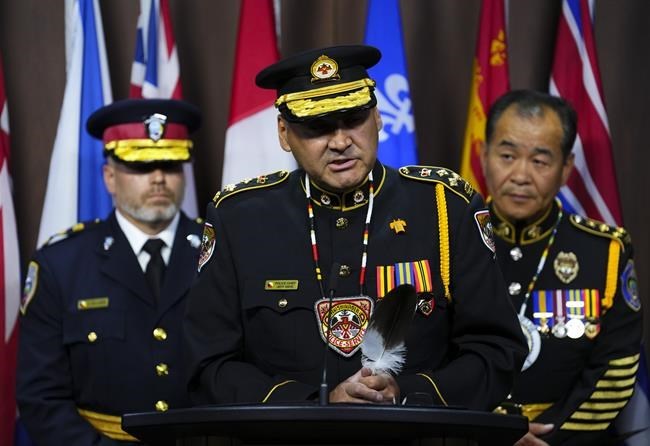OTTAWA — Recognizing First Nations rights in a proposed policing bill with Ottawa is a "sticking" point in the negotiations, a lawyer for the Assembly of First Nations announced Wednesday.
Julie McGregor updated chiefs gathered in Halifax on work to develop a law that would declare policing on First Nations an essential service — something Indigenous leaders have spent years calling for.
She told the organization's general assembly that afterthree years of working on the issue, the Department of Public Safety had provided a written explanation of what it does and doesn't plan to do with the legislation.
"It advised it does not have the mandate for inclusion of First Nations jurisdiction or rights recognition in the proposed legislation," McGregor said.
"We would say that's their interpretation … because there is the UN Declaration on the Rights of Indigenous Peoples Act and Canada's commitment to implementing the UN Declaration."
She added: "There is a basis for them to recognize jurisdiction and rights."
Prime Minister Justin Trudeau promised that his government would bring forward a new law in 2020.
Calls for its introduction were amplified last year after 11 people were stabbed and killed on James Smith Cree Nation and the nearby community of Weldon, Sask., where the RCMP was the police service of jurisdiction.
And leaders of First Nations police services that do exist say they are cash-strapped under an inequitable and overly rigid funding program from the 1990s that is cost-shared with provinces.
Such was the case for three First Nations police services in Ontario that were locked in disagreement with Ottawa over the terms of new funding arrangements, an impasse that resulted in cash not flowing.
Federal Court Justice Denis Gascon recently ordered Public Safety Canada to fund the services for 12 months.
The Assembly of First Nations celebrated the ruling for pointing out how the department handled itself in its negotiations and its failure to try and advance reconciliation.
The organization said the Anishinabek Police Service, Treaty Three Police Service and UCCM Anishnaabe Police Service had refused to sign onto the program because it included "discriminatory" clauses, such as one that prohibited First Nations police service from funding specialized units for investigations ranging from domestic violence to major crimes.
In a statement shared on social media Wednesday, Mendicino announced the government would not appeal the ruling.
"We will continue to engage with partners on this matter in the spirit of reconciliation, and ensure that the terms (and) conditions of the program reflect this commitment."
On Wednesday, McGregor said the organization told Ottawa in February it wants the proposed legislation to include "full rights recognition."
It only received a response back from Mendicino last week, she said.
McGregor said the minister communicated that he is committed to sorting out the jurisdiction issue with fellow cabinet ministers.
For his part, the minister has said he is committed to expanding to First Nations policing and has been working with individual communities and tribal councils to advance options.
But while the minister said last year that he hoped to table a bill by the fall, nothing was introduced before MPs broke for a summer recess in June.
His office has since stopped offering any details on a timeline for the legislation, citing the complexity of co-developing it.
Neither Public Safety nor the minister's office has responded to a request for comment.
Ghislain Picard, a member of the Assembly of First Nations executive who deals with justice matters, said they are hoping to see the bill presented when Parliament resumes in the fall.
This report by The Canadian Press was first published July 12, 2023.
Stephanie Taylor, The Canadian Press



